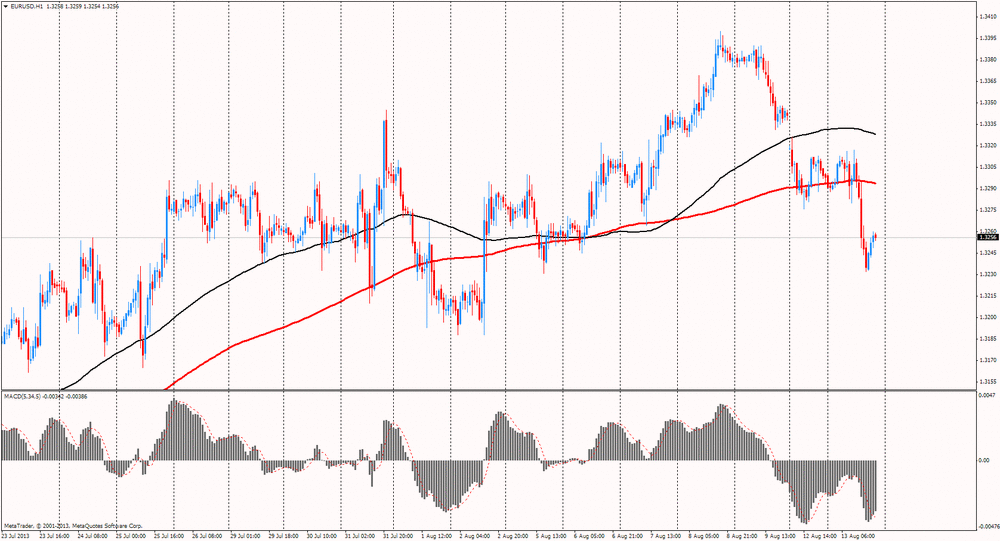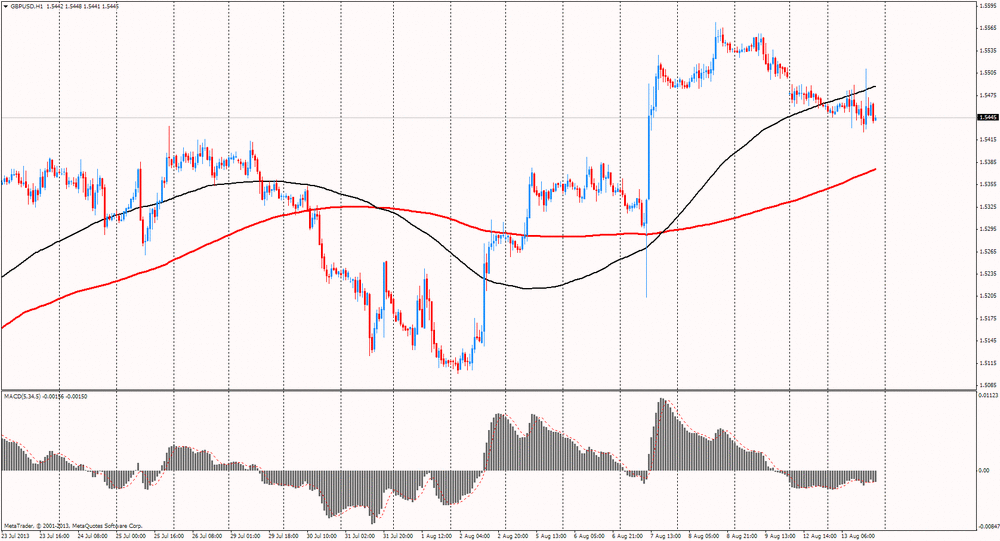- Analytics
- News and Tools
- Market News
- American focus: the euro fell sharply
American focus: the euro fell sharply
Euro fell against the U.S. dollar despite the strong data on industrial production in the euro area and the economic sentiment in Germany. It should be noted that industrial production in the euro zone rose to a seasonally adjusted 0.7 percent in June on a monthly measurement, offsetting a decline of 0.2 percent the previous month, which was revised from 0.3 percent fall. Economists had forecast that industrial production will grow more rapidly by 1.1 percent.
It also became known, the index of economic sentiment in Europe's largest economy rose to its highest level since March. A key indicator gave hope that a prolonged recession in the euro zone is coming to an end. Centre for European Economic Research ZEW reported an increase in the index to 42.0 in August, down from 36.3 in July, ahead of the growth forecast to 40.3.
Note that some support the U.S. currency was the U.S. data. It is learned that retail sales in the U.S. rose as expected in July. The pace of growth slowed compared to the previous month, partly due to the noticeable drop in car sales.
The report said that retail sales rose 0.2 percent in July after an upwardly revised 0.6 percent increase in June. Economists had expected sales to rise 0.2 percent compared with 0.4 percent growth, which was originally reported in the previous month.
Excluding the 1.0 percent drop in sales of vehicles and parts dealers, retail sales rose 0.5 percent in July compared with a 0.1 percent increase in June. The growth of retail sales excluding automobiles exceeded economists' estimates for a 0.4 percent rise.
Experts note that the decline in the euro contribute to the expectations publication of the report on the euro area's GDP, which will be presented tomorrow. It is expected that in the second quarter, the eurozone economy was able to show growth, and interrupt a series of cuts, which is fixed for 6 consecutive quarters.
The British pound fell slightly against the dollar after data on price indices. Inflation in the UK has slowed somewhat in July, with a 14-month high, and inflation output prices rose due to higher oil prices, showed data released by the Office for National Statistics (ONS) on Tuesday.
Consumer price inflation declined to 2.8 percent, according to the forecast from 2.9 percent in June. On a monthly basis, consumer prices were flat after falling 0.2 percent in June. Core inflation, which excludes prices of energy, food, alcoholic drinks and tobacco, slowed more than expected, up to 2 percent from 2.3 percent a month earlier. Economists predicted that core inflation will be 2.3 percent. In addition, the annual retail price inflation fell to 3.1 percent in July from 3.3 percent in June, in line with economists' forecasts.
In another ONS report showed that producer prices inflation rose to 2.1 percent in July from 2 percent in the previous month, in line with economists' forecasts. Selling prices increased 0.2 in July, a monthly measurement compared with growth of 0.1 percent in June. The main contribution to the monthly increase in prices of petroleum products made and food.
At the same time, inflation of purchase prices rose sharply to 5 percent from 4 percent in June. However, it remains below the consensus forecast of 5.5 percent. On a monthly measurement of the purchase prices rose 1.1 percent, slightly less than the 1.2 percent growth that had been expected in July.
© 2000-2026. All rights reserved.
This site is managed by Teletrade D.J. LLC 2351 LLC 2022 (Euro House, Richmond Hill Road, Kingstown, VC0100, St. Vincent and the Grenadines).
The information on this website is for informational purposes only and does not constitute any investment advice.
The company does not serve or provide services to customers who are residents of the US, Canada, Iran, The Democratic People's Republic of Korea, Yemen and FATF blacklisted countries.
Making transactions on financial markets with marginal financial instruments opens up wide possibilities and allows investors who are willing to take risks to earn high profits, carrying a potentially high risk of losses at the same time. Therefore you should responsibly approach the issue of choosing the appropriate investment strategy, taking the available resources into account, before starting trading.
Use of the information: full or partial use of materials from this website must always be referenced to TeleTrade as the source of information. Use of the materials on the Internet must be accompanied by a hyperlink to teletrade.org. Automatic import of materials and information from this website is prohibited.
Please contact our PR department if you have any questions or need assistance at pr@teletrade.global.

















